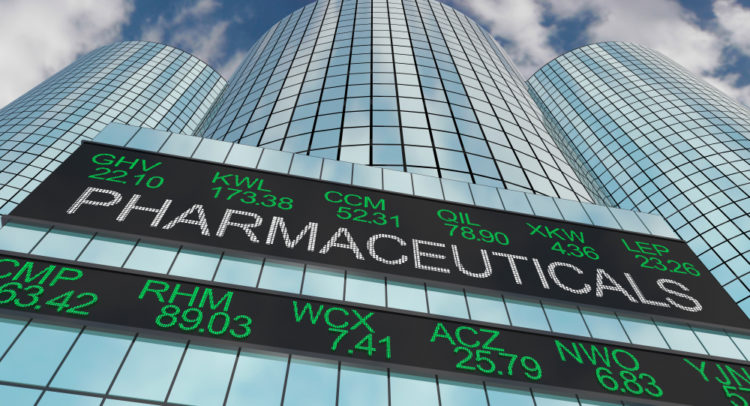The COVID-19 pandemic resulted in several pharmaceutical companies profiting handsomely with robust sales from COVID-19 vaccines. This has also resulted in pharma companies faring relatively better in the stock market vis-à-vis other sectors, even amid the current market volatility. While pharma stocks like Pfizer have seen their stock price drop around 13% this year, other stocks in this sector including AbbVie, Bristol Myers-Squibb, and Merck (MRK) have seen their stock prices rise by 12.2%, 23.1%, and 16%, respectively.
In the current volatile macroeconomic scenario with rising inflation, hiked interest rates, and geopolitical uncertainty, are any pharma stocks worth buying? It appears that, yes, there are some companies in this sector that are still undervalued by the market relative to their intrinsic value.
Using the TipRanks stock comparison tool, we will compare three such value stocks in the pharma sector including Pfizer, AbbVie, and Bristol Myers-Squibb. We will also examine what Wall Street analysts have been saying about these stocks.

Pfizer (NYSE: PFE)
Pfizer has been in the news this week after its acquisition of migraine drugmaker Biohaven Pharmaceutical Holding Company Ltd. (BHVN), in an all cash deal for $11.6 billion.
This deal comes just after Pfizer’s acquisition of Arena Pharmaceuticals and Reviral Ltd., and after PFE and BHVN had entered into a strategic partnership deal in November last year.
Through this acquisition, Pfizer intends to commercialize NURTEC® ODT (rimegepant), an innovative migraine therapy, designed to prevent and acutely treat migraines, a condition with high unmet need.
According to Mizuho Securities analyst Vamil Divan, considering Pfizer’s “strong presence in the primary care market,” the analyst believes “Nurtec’s clinical profile and single approach for both migraine treatment and prevention should resonate with primary care providers.”
According to the analyst, Pfizer expects around $6 billion in potential sales globally for the migraine franchise.
Moreover, Divan remained “pleased” with PFE’s “business development efforts, given the extra cash flows they have from sales of their COVID-19 vaccine Comirnaty and oral antiviral treatment Paxlovid.”
The analyst is of the view that the Biohaven deal will be another “near-term growth driver to the Pfizer portfolio.”
However, Divan stayed sidelined on the stock with a Hold rating as he remained concerned with “the extent of the patent expirations the company is facing and the further steps we believe the company needs to take to avoid significant sales declines in the second half of the decade.”
The analyst’s price target of $55 is nearer to the lowest price target of $50 on the Street and implies an upside potential of 11.2% at current levels. The stock is currently hovering near to its 52-week low with a closing price of $49.45 on May 11.
the rest of the analysts on the Street, however, are cautiously optimistic with a Moderate Buy consensus rating based on six Buys and eight Holds. The average Pfizer stock forecast is $58.92, implying a 19.3% upside potential to levels seen early Thursday.

AbbVie (NYSE: ABBV)
AbbVie delivered mixed Q1 results where it generated revenues of $13.5 billion, up 4.1% year-over-year but lagged consensus estimates of $13.6 billion. Adjusted earnings came in at $3.16 per share up 9.3% year-over-year, beating analysts’ expectations of $3.14 per share.
Last month, the company also announced the resignation of its Vice-Chairman Michael Severino, effective May 31.
AbbVie updated its adjusted diluted EPS guidance for FY22 to range between $13.92 and $14.12 from $14 to $14.20 per share earlier to account for the “unfavorable impact of $0.08 per share related to acquired IPR&D [in process research and development] and milestones expense incurred during the first quarter 2022.”
ABBV also lowered its revenue outlook for FY22 to $59.4 billion from $60 billion earlier to include “updated Restasis [drug] sales of approximately $400 million,” and account for an unfavorable impact of 1.5% due to currency exchange fluctuations.
However, Mizuho Securities analyst Vamil Divan is bullish “on the AbbVie story given the more diversified growth we believe they are poised to deliver, although we acknowledge uncertainty around the impact of the upcoming Humira US loss of exclusivity will likely keep shares trading at a discount to its peers.”
The analyst reiterated a Buy rating on the stock and a price target of $166, implying an upside potential of 9.2% at current levels.
Other analysts on the Street are cautiously optimistic with a Moderate Buy consensus rating based on 11 Buys and six Holds. The average ABBV stock forecast is $163.24, implying a 6.7% upside potential to early morning levels on Thursday.

Bristol Myers Squibb (NYSE: BMY)
Bristol Myers Squibb delivered strong Q1 results with revenues up 7% year-over-year to $11.65 billion, surpassing analysts’ expectations of $11.42 billion. The pharma company’s adjusted earnings came in at $1.96 per share, while analysts were expecting earnings of $1.94 per share.
Giovanni Caforio, M.D., board chair and CEO of Bristol Myers Squibb stated in its Q1 press release, “We continue to execute against our strategic priorities, deliver solid revenue and earnings growth and advance our product pipeline. Thanks to our team’s hard work and dedication, we achieved regulatory approvals of Opdualag and Camzyos, our new first-in-class medicines for patients living with metastatic melanoma and symptomatic obstructive hypertrophic cardiomyopathy, respectively.”
BMO Capital analyst, Evan Seigerman, while enthused by the U.S. FDA approval for Camzyos and the Q1 results, remained watchful of the faster-than-expected slide in revenue from its cancer drug Revlimid.
Revenues for Revlimid declined 5% year-over-year to $2.8 billion in Q1.
Siegerman remained bullish on the stock with a Buy rating and raised the price target from $87 to a Street high of $92 on the stock following the Camzyos approval. The analyst’s raised price target implies an upside potential of 20.8% to current levels.
Other analysts on the Street are cautiously optimistic with a Moderate Buy consensus rating based on six Buys, two Holds, and two Sells. The average BMY stock forecast is $76.10, implying that the stock is priced in at current levels.

Bottom Line
Currently, the pharma industry is trading at a three-year average price-to-earnings ratio of 20.2x while shares of Pfizer, AbbVie, and BMY are trading at a P-E ratio of 11.4x, 21.8x, and 27x, respectively.
This indicates that Pfizer could be the only undervalued stock in this batch. While analysts are cautiously optimistic about all three stocks, based on the upside potential over the next 12 months, PFE certainly seems to be a better Buy.
Discover new investment ideas with data you can trust.
Read full Disclaimer & Disclosure









